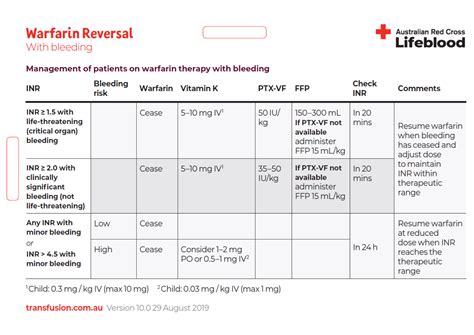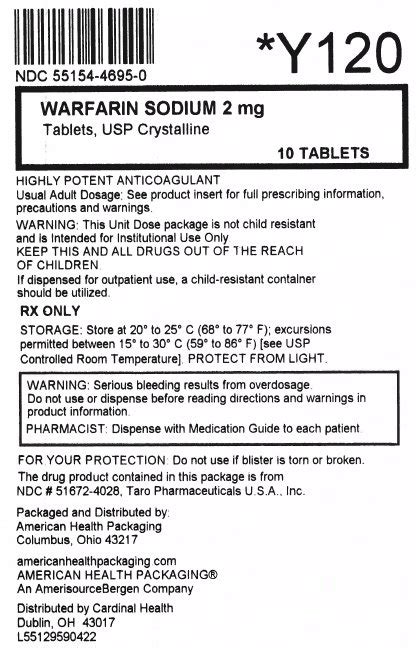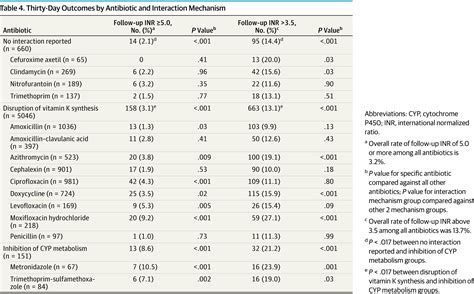Intro
Warfarin is a medication that has been widely used for decades to prevent blood clots from forming or growing. It is commonly prescribed for individuals who have experienced a blood clot in the past, as well as those who are at high risk of developing one. The importance of warfarin cannot be overstated, as it has been shown to significantly reduce the risk of stroke, heart attack, and other serious health complications. In this article, we will delve into the uses and benefits of warfarin, as well as its potential side effects and interactions.
The use of warfarin is particularly crucial for individuals who have certain medical conditions, such as atrial fibrillation, deep vein thrombosis, or pulmonary embolism. These conditions can increase the risk of blood clots forming, which can be life-threatening if left untreated. Warfarin works by blocking the production of vitamin K-dependent clotting factors in the liver, which helps to prevent blood clots from forming. By taking warfarin as directed, individuals can significantly reduce their risk of developing a blood clot, which can help to prevent serious health complications.
Warfarin has been shown to be highly effective in preventing blood clots, and it is often prescribed for individuals who have a high risk of developing one. The medication is typically taken orally, and it is usually prescribed in conjunction with other medications, such as aspirin or heparin. The dosage of warfarin will vary depending on the individual's specific medical condition, as well as their overall health and medical history. It is essential to take warfarin exactly as directed, as taking too much or too little of the medication can increase the risk of side effects.
How Warfarin Works

Warfarin works by blocking the production of vitamin K-dependent clotting factors in the liver. These clotting factors are essential for the formation of blood clots, and by blocking their production, warfarin helps to prevent blood clots from forming. The medication is typically taken orally, and it is absorbed into the bloodstream, where it can begin to work. The effects of warfarin can be seen within a few days of taking the medication, and it is usually prescribed for an extended period, such as several months or even years.
Benefits of Warfarin
The benefits of warfarin are numerous, and the medication has been shown to be highly effective in preventing blood clots. Some of the benefits of warfarin include: * Reduced risk of stroke and heart attack * Prevention of blood clots in individuals with a high risk of developing one * Effective in preventing blood clots in individuals with atrial fibrillation, deep vein thrombosis, or pulmonary embolism * Can be taken orally, making it a convenient option for individuals who have difficulty with injections or other forms of medicationSide Effects of Warfarin

While warfarin is generally well-tolerated, it can cause side effects in some individuals. Some common side effects of warfarin include:
- Bleeding or bruising easily
- Nausea or vomiting
- Diarrhea or stomach pain
- Fatigue or weakness
- Hair loss or skin rash
It is essential to report any side effects to a healthcare provider, as they can help to determine the best course of treatment. In some cases, the dosage of warfarin may need to be adjusted, or other medications may be prescribed to help manage side effects.
Interactions with Other Medications
Warfarin can interact with other medications, which can increase the risk of side effects. Some medications that can interact with warfarin include: * Aspirin or other anti-inflammatory medications * Heparin or other anticoagulant medications * Certain antibiotics or antifungal medications * Vitamin K supplements or foods high in vitamin KIt is essential to inform a healthcare provider about any medications or supplements being taken, as they can help to determine the best course of treatment.
Monitoring Warfarin Therapy

Warfarin therapy requires regular monitoring to ensure that the medication is working effectively and safely. This typically involves regular blood tests to check the international normalized ratio (INR), which measures the time it takes for blood to clot. The INR is used to determine the effectiveness of warfarin, and it can help to identify any potential side effects.
Warfarin and Pregnancy
Warfarin is not recommended during pregnancy, as it can increase the risk of birth defects. Women who are pregnant or planning to become pregnant should inform their healthcare provider, as they can help to determine the best course of treatment. In some cases, alternative medications may be prescribed, or the dosage of warfarin may need to be adjusted.Warfarin and Breastfeeding

Warfarin is not recommended during breastfeeding, as it can pass into breast milk and increase the risk of bleeding in the baby. Women who are breastfeeding should inform their healthcare provider, as they can help to determine the best course of treatment. In some cases, alternative medications may be prescribed, or the dosage of warfarin may need to be adjusted.
Warfarin and Age
Warfarin can be prescribed for individuals of all ages, including older adults. However, older adults may be more susceptible to side effects, such as bleeding or bruising easily. Regular monitoring is essential to ensure that warfarin is working effectively and safely.Warfarin and Diet

Warfarin can interact with certain foods, which can increase the risk of side effects. Foods that are high in vitamin K, such as leafy green vegetables, can reduce the effectiveness of warfarin. It is essential to inform a healthcare provider about any dietary changes, as they can help to determine the best course of treatment.
Warfarin and Exercise
Warfarin can increase the risk of bleeding or bruising easily, which can be a concern for individuals who engage in regular exercise. However, regular exercise can also help to improve overall health and reduce the risk of blood clots. It is essential to inform a healthcare provider about any exercise routine, as they can help to determine the best course of treatment.Conclusion and Next Steps

In conclusion, warfarin is a highly effective medication that can help to prevent blood clots and reduce the risk of serious health complications. While it can cause side effects, regular monitoring and adjustments to the dosage can help to minimize these risks. It is essential to inform a healthcare provider about any medications, supplements, or dietary changes, as they can help to determine the best course of treatment. By working closely with a healthcare provider, individuals can ensure that warfarin is working effectively and safely.
We invite you to share your thoughts and experiences with warfarin in the comments section below. Have you or a loved one taken warfarin? What were your experiences with the medication? Share your story and help others who may be considering warfarin therapy.
What is warfarin used for?
+Warfarin is used to prevent blood clots from forming or growing. It is commonly prescribed for individuals who have experienced a blood clot in the past, as well as those who are at high risk of developing one.
How does warfarin work?
+Warfarin works by blocking the production of vitamin K-dependent clotting factors in the liver. This helps to prevent blood clots from forming and reduces the risk of serious health complications.
What are the potential side effects of warfarin?
+Common side effects of warfarin include bleeding or bruising easily, nausea or vomiting, diarrhea or stomach pain, fatigue or weakness, and hair loss or skin rash. It is essential to report any side effects to a healthcare provider, as they can help to determine the best course of treatment.
Can warfarin interact with other medications?
+Yes, warfarin can interact with other medications, which can increase the risk of side effects. It is essential to inform a healthcare provider about any medications or supplements being taken, as they can help to determine the best course of treatment.
How long does it take for warfarin to start working?
+The effects of warfarin can be seen within a few days of taking the medication. However, it may take several weeks or even months for the full effects of warfarin to be realized.
